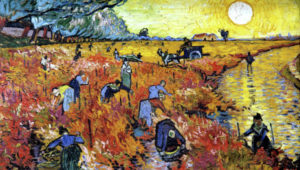I doubt we are breaking any new ground here by saying that the internet is awesome.
You can stalk your crush, visit the pyramids, share fun memes, all from the comfort of your very own toilet seat.
It is also very helpful to the modern artist. You have at your fingertips the greatest tool ever for self promotion.
But maybe you love creating just for yourself and that is all you need. Though you know you always have the option, if you want, to get your work out there for that sweet recognition.
So with this in mind…
Here are five artists who really deserved some shares and likes before they kicked the proverbial bucket.
Let’s start with the obvious.
Vincent Van Gogh
You know Van Gogh and you know his art. Most of you probably know that it was only after his death that his art became recognised as the masterful works that they are.
It is unfathomable how much of a struggle life must have been for Van Gogh. He was quite unwell, to put it lightly.
What really gives it some perspective is the fact that Van Gogh only sold one painting during his lifetime. It was his piece The Red Vineyard Near Arles. The rest of Van Gogh’s 900 paintings were not sold until after his death, all thanks to his brother.
Thanks bro.

The Red Vineyard Near Arles
Claude Monet
Monet is another artist who you know but it surprised me to learn that he was never successful during his lifetime. His Impressionist style was rebuked by the art community. It was a new style and often when something is new and different it gets met with resistance.
According to some accounts of Monet and his life, he was never financially comfortable and always held a day job. He continued painting until late in his life, even with eye problems and in poor health.
Monet always considered himself a failure. In 2008 his painting Le Bassin Aux Nymphéas sold for US$88 million.

Le Bassin Aux Nymphéas
Herman Melville
Departing from the world of painters, another notable addition to this group notables is Herman Melville, most famous for writing Moby Dick.
He had a hatred for authority and the confines of society so he spent much of his life at sea exploring the world. It was only on his return that he was encouraged to put his experiences to paper.
That isn’t to say that Melville wasn’t a known writer in his day, but great success never came, and by the age of 35 he had almost given up this pursuit. So he began working in customs at the New York docks where he remained for 19 years.
After his death in 1891 it took until 1919 for his fiction and poetry to become recognised in a period called the “Melville Revival”. This not too timely revival resulted in a biography about his life which brought attention to Moby Dick, considered one of the great literary masterpieces.
Now to totally change it up.
Bradley Nowell
Bradley Nowell was the lead singer and songwriter of Sublime before his death in 1996.
The Sublime trio were surfer-bums from California who partied hard, loved reggae and ska, and with his laissez-faire attitude, Nowell became a counter-culture iconoclastic hero. And he wrote absolute ripper tunes.
While Sublime were known in America, it was their eponymous third album Sublime, released after Nowell’s death, which became an international hit. It was also their first album recorded in a professional studio as the band had a love of breaking into recording studios late at night to record in secret. It was cheaper this way.
If you haven’t heard What I Got, shame on you.
And finally…
Franz Kafka
There are some artists who do something so unusual that until they came along there was no name for it. Impressionism, Cubism, and Pointillism are all examples in art, but this also extends to literature.
You may have heard the term “Kafkaesque” before. Franz Kafka was so unusual with his writing that the style he created birthed an entire concept that didn’t exist before. It’s the literary version of calculus. Except weirder.
The Trial by Kafka is possibly one of his most famous books. Described as phantasmagorical and dream-like, it is just so utterly strange and compelling, you never know where it is heading or how it arrived.
Before his death at age 40 he asked his friend destroy all his unpublished works, which was pretty much all of his writing. Like all good friends he didn’t listen.
As testament to his influence, in 1988 his handwritten manuscript of The Trial was sold at auction for $1.98 million.